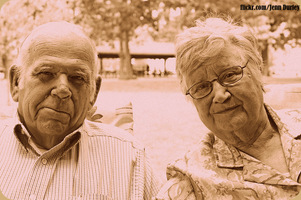|
In the United States, an aging population and the increase in home elderly care, adult day care, and assisted living centers means that more people are relying on others to care for their parents, grandparents, and friends. With children, people tend to take more precaution and are concerned with abuse. However, spiraling rates of elder mistreatment are reported by both practitioners and researchers. As noted by the National Committee for the Prevention of Elder Abuse: There were 253,421 reports of abuse of adults age 60+ or 832.6 reports for every 100,000 people over the age of 60. The National Elder Abuse Incidence Study (National Center on Elder Abuse, 1998) found that more than 500,000 persons aged 60+ were victims of domestic abuse and that an estimated 84% of incidents are not reported to authorities, denying victims the protection and support they need. Elder abuse is estimated to cost Americans tens of billions of dollars annually in health care, social services, investigative and legal costs, and lost income and assets. Obviously, people should take this issue as seriously as child care or child abuse. Like child abuse, the warning signs are similar. Here are just a few, courtesy of the National Center of Elder Abuse:
The challenge that many people face, both with child and elder abuse, is that the abuse is often difficult to identify and goes unreported by the abused. With elders in particular, they may live in assisted living centers in communities where no immediate family is available. Consequently, the ability for family members to “keep tabs” on the care given by providers is reduced. Alternatively, they may live with a family member who does not provide adequate care or is emotionally abusive. Of course, this is a sensitive subject. However, assessments of care centers and investigations into potential abuse by relatives should not be avoided. While there are many resources available once abuse has been identified, there are not many resources available to people who simply suspect abuse. One available resource is a local private investigator. Utilizing a wide variety of investigative skills and expertise, along with some rights and privileges provided by state licensure, private investigators can give clients knowledge and assurance that a loved one is properly cared for. Here are just a few things a private investigator can do:
If you suspect that someone you know may be suffering from elderly abuse and would like to know more about what a private investigator can do to assist you, please contact me for a free consultation. You can hold care providers legally and civilly accountable for their mistreatment, neglect, or abuse of the elderly. Comments are closed.
|
Equipment is importantCovert Investigations uses Gen-3 military grade night vision on all night surveillance. See a demo at:
http://www.covert-pi.com/services.html and http://www.covert-pi.com/ Gen-3 equipment gives you facial recognition from long distances in the middle of the night and with little to no light. The Gen-3 equipment is not to be confused with the inadequate night shot feature that comes standard with all video cameras. That video when produced only gives silhouetted images and is useless for evidence purposes. If you have an assignment at night and you want quality identifiable evidence please call me or search a company that has similar equipment. If an agency says they have Gen-3 equipment demand it be used and refuse to pay for the assignment if the it is not used. Covert Investigations will never bill a client for failure on our part. Your evidence is important to your case. Be sure your Investigator has that equipment. Observations & Interviews, a blog by Chet EngstromChet Engstrom is owner of Covert Investigations Services, a private investigations firm located in Lewisville, Texas (DFW area). Texas license number: C10745. Archives
February 2017
Categories
All
|
Location4101 McEwen, Dallas, TX, 75244
|
|

 RSS Feed
RSS Feed
